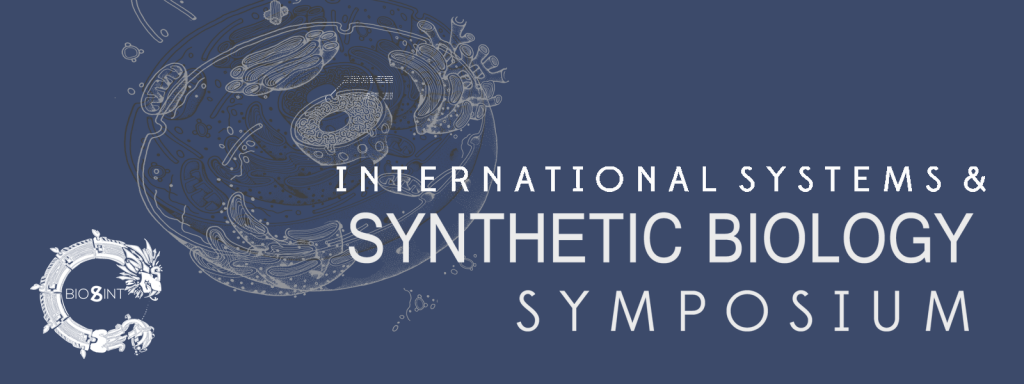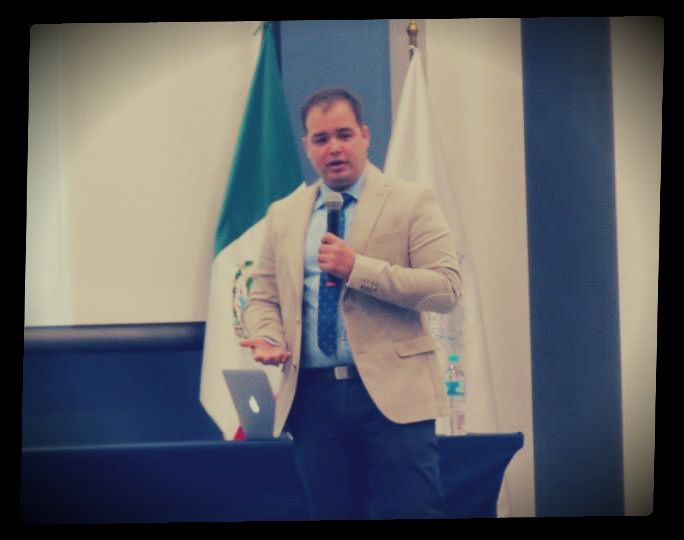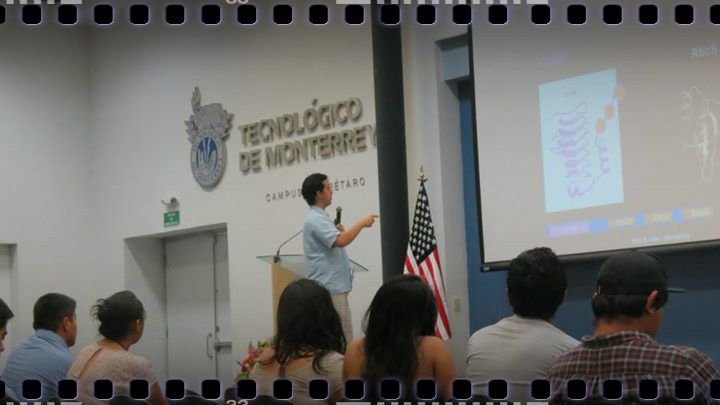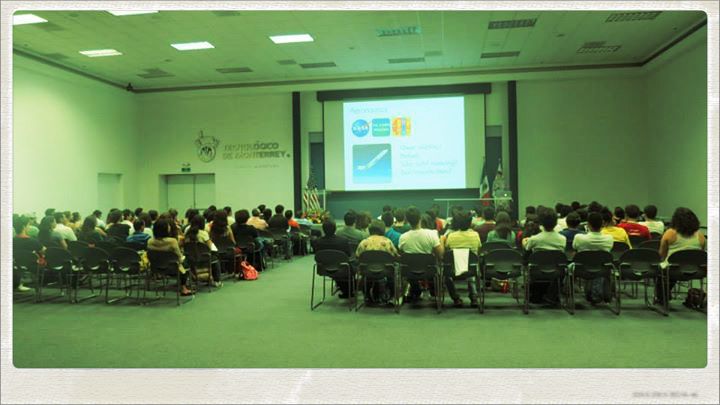Team:BIOSINT Mexico/symposium
From 2014.igem.org
| (29 intermediate revisions not shown) | |||
| Line 3: | Line 3: | ||
<head> | <head> | ||
<style> | <style> | ||
| - | + | </style> | |
| - | + | </head> | |
| - | + | ||
| - | + | ||
| - | + | ||
| - | + | ||
| - | + | ||
| - | . | + | <body> |
| - | + | <center> | |
| - | + | <img id="bannersympo" style="width: 900px" src="http://i1369.photobucket.com/albums/ag216/lmistrange/BANNERSYMPOSIUM_zps53a40e47.png"> | |
| - | + | </center> | |
| - | + | <div class="texto1"> | |
| + | <h1> IS&SB SYMPOSIUM </h1> | ||
| + | <p style="vertical-align:text-top;"> | ||
| + | <p> Our question: how can BIOSINT promote synthetic biology in Queretaro? | ||
| - | + | <p style="vertical-align:text-top;"> | |
| - | + | <b>Our approach: in order to encourage the participation of students to this event we decided to invite synbio experts from the US and Mexico, and left broad topic talks to encompass multidisciplinary backgrounds. And opened the First International Systems and Synthetic Biology Symposium, which took place at the Tecnológico de Monterrey Campus Querétaro on April 25th, 2014. The speakers that headed the agenda were:<br/><br/></p> | |
| - | + | ||
| - | < | + | <p style="vertical-align:text-top;"><img style="width: 320px; padding-right:10px;" src= http://i1379.photobucket.com/albums/ah147/juanjoquispe/6Simp_zpsa130f2cc.jpg align="left"> PhD. J. Rubén Morones presented <b>“Approaches to Engineer and Design Antimicrobial Therapeutics”</b> in which he explained three engineering approaches to solve some of the challenges in antibiotics development. The first involves exploring potentiation of current antibiotics using novel and naturally existing therapeutic adjuvants (such as silver and supplementary metallic micronutrients). The second includes the work in progress to develop novel drug delivery systems, using Nanotechnology and Synthetic Biology. Finally, the third addresses the commitment to discover novel antimicrobial molecules and therapies.<br/><br/> </p> |
| - | </ | + | <p style="vertical-align:text-top;"><img style="width: 340px; padding-left:10px;" src=http://i1379.photobucket.com/albums/ah147/juanjoquispe/4Simp_zps9278254c.jpg align="right"> PhD. César González who presented <b>“Assembly of Carboxysome”</b>, explained how this bacterial microcompartiment is important for cyanobacteria and their dependence to concentrate carbon dioxide near RuBisCo while minimizing the unproductive side reaction with oxygen.<br/><br/><br/> </p> |
| - | < | + | |
| + | |||
| + | |||
| + | <p style="vertical-align:text-top;"><img style="width: 340px; padding-right:10px;" src=https://static.igem.org/mediawiki/2014/a/aa/Henrik.jpg align="left"> PhD. Henrik V. Scheller who talked about <b>“Plant synthetic biology: Engineering of Plants for use as Biorefinery Feedstocks”</b>, in which he explains about the developing technology to convert plant biomass to fuels and how The Feedstocks Team at the Joint Bioenergy Institute is using synthetic biology tools to engineer high yielding plants that are more easily degraded into fermentable sugars by using the rerouting of metabolic pathways and design of artificial transcriptional networks to control gene expression.<br/><br/> </p> | ||
| + | |||
| + | |||
| + | <p style="vertical-align:text-top;"><img style="width: 350px; padding-left:10px" src= http://i1379.photobucket.com/albums/ah147/juanjoquispe/3Simp_zps398773ca.jpg align="right"> Dr. Lynn J. Rothschild from NASA who presented <b>“From Extremophiles to Star Trek, The Use of Synthetic Biology in Astrobiology”</b> in which she explained how her lab has focused on the potential of synthetic biology to revolutionize the three major parts of astrobiology which are: where do we come from? Where are we going? And are we alone? <br/><br/></p> | ||
| + | |||
| + | |||
| + | |||
| + | <h2> Coffee Break </h2> | ||
| + | |||
| + | <p style="vertical-align:text-top;">During this activity the participants were able to interact one-on-one with the speakers. Curiosity questions prominently involved on how every speaker had succeeded on finding and eventually working in their respective passion on the field of science. And finally, the perspective of every lecturer on what the future holds for synthetic biology in Mexico and the world.<br/> | ||
<center> | <center> | ||
| - | <img | + | <img style="width: 650px" src="https://static.igem.org/mediawiki/2014/3/3f/Coffee_break_sesion.jpg" alt="Coffee Break Sesion"> |
</center> | </center> | ||
| + | </p> | ||
| + | |||
| + | <h2> Poster session </h2> | ||
| + | |||
| + | <p style="vertical-align:text-top;">During this session, participants presented in a pleasant and attractive way the results of their research projects involving synthetic biology and biotechnology. Moreover, the audience could read, analyze and study the content poster when they wanted and for the time they needed. So it was a time for sharing information with the attendees and the speakers since a direct contact was established. | ||
| + | <br/> | ||
| + | <center> | ||
| + | <img style="width: 650px" src="https://static.igem.org/mediawiki/2014/a/a5/Sesion_Posters.jpg" alt="Poster Session"> | ||
| + | </center> | ||
| + | <br/> | ||
| + | </p> | ||
| + | |||
| + | <p> <b> | ||
| + | As a result of this event we were able to ask specific doubts related to plant biology and methodology to the speakers as well as the state of the art, according to their preceptions about the feasibility of synthetic biology in Mexico. This allowed us to come in contact with the answers that couldn´t be responded by our previews research or advisor. | ||
| + | |||
| + | From the behalf of our team this symposium has been an experience of discovery, as talented researchers from Mexico and United States were summoned to deliver to the public a taste of applied synthetic biology and systems biology technologies. We are excited to say that our first big event was attended by a variety of students from other universities and states! However, we also realized that the general public of Queretaro, who were our particular aim wasn´t as participative as we had expect them to. Making it possible that the dates we selected for the symposium, during vacations, and the ampunt of days backfired the amount of attendees. Yet we hope that the diversification of topics given on the 25th of April, about synthetic biology and biology systems made Friday unforgettable and brighten the passion for science inside every participant. | ||
| + | </b> | ||
| + | </br></br></p> | ||
| + | |||
| + | |||
</body> | </body> | ||
</html> | </html> | ||
Latest revision as of 03:02, 18 October 2014

IS&SB SYMPOSIUM
Our question: how can BIOSINT promote synthetic biology in Queretaro?
Our approach: in order to encourage the participation of students to this event we decided to invite synbio experts from the US and Mexico, and left broad topic talks to encompass multidisciplinary backgrounds. And opened the First International Systems and Synthetic Biology Symposium, which took place at the Tecnológico de Monterrey Campus Querétaro on April 25th, 2014. The speakers that headed the agenda were:
 PhD. J. Rubén Morones presented “Approaches to Engineer and Design Antimicrobial Therapeutics” in which he explained three engineering approaches to solve some of the challenges in antibiotics development. The first involves exploring potentiation of current antibiotics using novel and naturally existing therapeutic adjuvants (such as silver and supplementary metallic micronutrients). The second includes the work in progress to develop novel drug delivery systems, using Nanotechnology and Synthetic Biology. Finally, the third addresses the commitment to discover novel antimicrobial molecules and therapies.
PhD. J. Rubén Morones presented “Approaches to Engineer and Design Antimicrobial Therapeutics” in which he explained three engineering approaches to solve some of the challenges in antibiotics development. The first involves exploring potentiation of current antibiotics using novel and naturally existing therapeutic adjuvants (such as silver and supplementary metallic micronutrients). The second includes the work in progress to develop novel drug delivery systems, using Nanotechnology and Synthetic Biology. Finally, the third addresses the commitment to discover novel antimicrobial molecules and therapies.
 PhD. César González who presented “Assembly of Carboxysome”, explained how this bacterial microcompartiment is important for cyanobacteria and their dependence to concentrate carbon dioxide near RuBisCo while minimizing the unproductive side reaction with oxygen.
PhD. César González who presented “Assembly of Carboxysome”, explained how this bacterial microcompartiment is important for cyanobacteria and their dependence to concentrate carbon dioxide near RuBisCo while minimizing the unproductive side reaction with oxygen.
 PhD. Henrik V. Scheller who talked about “Plant synthetic biology: Engineering of Plants for use as Biorefinery Feedstocks”, in which he explains about the developing technology to convert plant biomass to fuels and how The Feedstocks Team at the Joint Bioenergy Institute is using synthetic biology tools to engineer high yielding plants that are more easily degraded into fermentable sugars by using the rerouting of metabolic pathways and design of artificial transcriptional networks to control gene expression.
PhD. Henrik V. Scheller who talked about “Plant synthetic biology: Engineering of Plants for use as Biorefinery Feedstocks”, in which he explains about the developing technology to convert plant biomass to fuels and how The Feedstocks Team at the Joint Bioenergy Institute is using synthetic biology tools to engineer high yielding plants that are more easily degraded into fermentable sugars by using the rerouting of metabolic pathways and design of artificial transcriptional networks to control gene expression.
 Dr. Lynn J. Rothschild from NASA who presented “From Extremophiles to Star Trek, The Use of Synthetic Biology in Astrobiology” in which she explained how her lab has focused on the potential of synthetic biology to revolutionize the three major parts of astrobiology which are: where do we come from? Where are we going? And are we alone?
Dr. Lynn J. Rothschild from NASA who presented “From Extremophiles to Star Trek, The Use of Synthetic Biology in Astrobiology” in which she explained how her lab has focused on the potential of synthetic biology to revolutionize the three major parts of astrobiology which are: where do we come from? Where are we going? And are we alone?
Coffee Break
During this activity the participants were able to interact one-on-one with the speakers. Curiosity questions prominently involved on how every speaker had succeeded on finding and eventually working in their respective passion on the field of science. And finally, the perspective of every lecturer on what the future holds for synthetic biology in Mexico and the world.

Poster session
During this session, participants presented in a pleasant and attractive way the results of their research projects involving synthetic biology and biotechnology. Moreover, the audience could read, analyze and study the content poster when they wanted and for the time they needed. So it was a time for sharing information with the attendees and the speakers since a direct contact was established.

As a result of this event we were able to ask specific doubts related to plant biology and methodology to the speakers as well as the state of the art, according to their preceptions about the feasibility of synthetic biology in Mexico. This allowed us to come in contact with the answers that couldn´t be responded by our previews research or advisor. From the behalf of our team this symposium has been an experience of discovery, as talented researchers from Mexico and United States were summoned to deliver to the public a taste of applied synthetic biology and systems biology technologies. We are excited to say that our first big event was attended by a variety of students from other universities and states! However, we also realized that the general public of Queretaro, who were our particular aim wasn´t as participative as we had expect them to. Making it possible that the dates we selected for the symposium, during vacations, and the ampunt of days backfired the amount of attendees. Yet we hope that the diversification of topics given on the 25th of April, about synthetic biology and biology systems made Friday unforgettable and brighten the passion for science inside every participant.
 "
"
